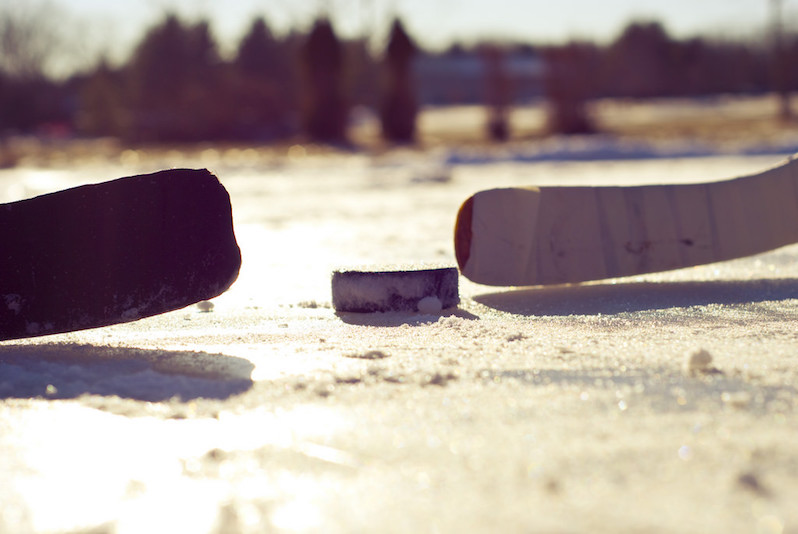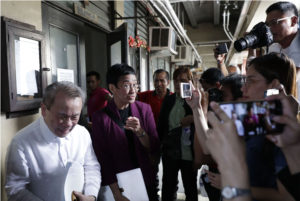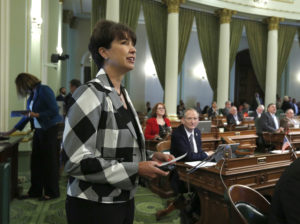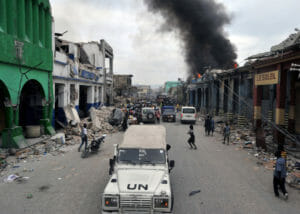A Canadian Game in Which ‘No’ Means ‘Yes’
As sure as autumn brings cool days, so does each year’s junior hockey season bring new sexual allegations. That few cases make it to court and even fewer to conviction speaks to the emphasis the judicial system puts on the “credibility” of the plaintiff and the extraordinary support local heroes receive from town power brokers. Tyler / Flickr (CC-BY-SA)
1
2
Tyler / Flickr (CC-BY-SA)
1
2
Editor’s note: This article is part of a series of stories on the topic of violence against women that Truthdig is presenting on a biweekly basis. To read other pieces in this series, click here, here and here.
In 1992, while investigating a story in northern Saskatchewan, an informant took me aside. “If you really want to investigate something, go down to Swift Current. I took a welding course with a guy from there. The hockey players raped his cousin and got away with it. She was learning-disabled, too,” he told me.
That tip led to a six-year odyssey—visiting junior hockey arenas, talking to kids who attended local schools and hung out at nearby malls, and taking phone calls at all hours from young people—both male and female—who wanted to talk about what the hockey team did to them.
I worked on a documentary that aired in 1996 on the Canadian Broadcasting Corp. program “The Fifth Estate,” and my book, “Crossing the Line: Violence and Sexual Assault in Canada’s National Sport,” was published in 1998, but just as surely as autumn brings cool, short days, so does the next hockey season bring new sets of allegations.
That sexual assaults are sure to happen has much to do with the culture surrounding the sport. That few ever make it to court and even fewer to a conviction speaks to the emphasis the judicial system puts on the “credibility” of the plaintiff and the extraordinary support local heroes receive from town power brokers.
In this high-stakes world where young males compete to catch the eye of NHL scouts, sex can be just as competitive. Not all players subscribe to the culture—in fact, the majority of a team may want nothing to do with it, but all keep the team secrets and learn to recite the “official story” to protection another.
In such a culture, sex is synonymous with hockey. It becomes a means to demonstrate aggressive, violent masculinity; and as such, it is frequently performed in a group so the teammates can witness one another’s performance. But instead of performing on an ice rink, they use the female body.
The sexual relationship is between the players; the female body is a conduit. There is no intimacy, love or understanding of female pleasure; only contempt as girls are called “dirties” and “puck bunnies.” Teammates cheer each other on as they perform on the female, sometimes entering her body at the same time, and when they have all “scored,” they are done. When this team-building exercise intersects with the entitlement of male players and the sexist notions still alive in hockey, a rape culture thrives—not just in Swift Current, but in many of the towns in which junior hockey players are anointed young gods.
With one exception, every female I wrote about in “Crossing the Line” left her town for good after experiencing a sexual assault. In the case below, two girls stayed; one left. Those two will leave next year for postsecondary institutions.
On March 7, 2015, in Cobourg, Ontario, the junior hockey season was wrapping up. That meant a house party. Susan (not her real name) attended with two friends. She almost didn’t go because she’d been competing in her own sport all day, but in the end, her father dropped the three of them off around 10:30 p.m. Susan had brought four “Tequila Rose” coolers. “There were still two coolers when we left,” she tells me as we sit in a park by Lake Ontario months later. Her mother sits with us. “They’re 550 to 600 [milliliters, or 18 to 20 ounces] and 5 to 7 percent alcohol. That’s all I drank.”
The house had a room set aside for smokers. Susan doesn’t smoke, but she went there to see friends and distinctly remembers seeing one of the players with a large zip-lock bag one-quarter filled with white pills. She recalls him saying, “Tonight’s going to be a good night,” and laughing. She heard someone else say there was going to be “a rape fest.”
The next thing Susan remembered was going into a bedroom “with a bunch of people.” But soon after, she realized she was alone in the room with two hockey players. “The door shut—I remember the noise,” she tells me. “I didn’t close it. The other thing is they’re saying, ‘You’re the prettiest girl at the party. We’ve been looking at you all night.’ I don’t even remember what I said. I was like, ‘right, sure.’ ”
One of the players started to kiss her. Susan is sure she told him she was seeing someone, but that didn’t seem to matter. “It’s in my head—like a cartoon I was watching on TV. This is so hard.” She has to compose herself and eventually adds, “I only remember taking my top off; I don’t remember who took it off, but it came off. I had four layers on. One of the guys put the dresser over the door.”
Doing the math from when she was able to call her mother and ask her to pick her up, Susan figures it was around 12:30 p.m. when they cornered her. “I was saying ‘no’ the whole time—I know it—and after they moved the dresser, I was freaking. They’re so much taller than me.”
Meanwhile, Susan’s mother just didn’t feel right and started texting her to say, “I’m here” if her daughter needed to be picked up, but there was little response. “If only I’d listened to my intuition,” she said, as she sat by her daughter at the lake. Eventually Susan broke the door down and called her mother. She grabbed her shoes without putting them on and ran out of the house, despite the mid-March weather, sobbing as she got into her mother’s car.
She doesn’t know what was done to her or what she did for the players but says none of it was consensual. “How do I prove that I said no? Why is consent even a thing if I can’t prove it? There’s no point.”
Your support matters…
SUPPORT TRUTHDIG
Independent journalism is under threat and overshadowed by heavily funded mainstream media.
You can help level the playing field. Become a member.
Your tax-deductible contribution keeps us digging beneath the headlines to give you thought-provoking, investigative reporting and analysis that unearths what's really happening- without compromise.
Give today to support our courageous, independent journalists.







You need to be a supporter to comment.
There are currently no responses to this article.
Be the first to respond.